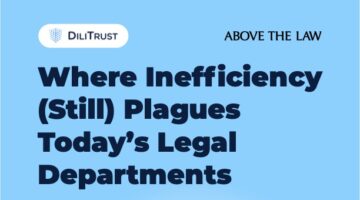We all know that in this legal economy, 1L grades are critically important. There aren’t enough good jobs to go around, and coming out of your first semester with a strong transcript can really help. This is why some law students flip out over changes (real or perceived) to grading policies or curves.
But getting a bad grade is not the end of the world. Performing well on law school exams is a skill, one that doesn’t come naturally to everybody. And in light of the length of a person’s entire legal career, it’s kind of amazing that people stress out so much over 1L transcripts.
At Columbia Law School, the administration wants first-year students to keep a sense of perspective about their grades. In a very nice gesture, Dean of Students Michelle Greenberg-Kobrin sent the 1Ls a nice message that highlighted some of the poor grades achieved by some Columbia’s own faculty.

Best Practices In Trust Accounting: What Every Lawyer Needs To Know
Learn legal trust accounting best practices to ensure compliance and protect client funds. Discover expert tips to set your firm up for success.
The message was clearly “Everything is going to be fine.” But not all Columbia students took it that way…
To be clear, I happen to think this was a very nice letter for Columbia to send to its 1Ls. It begins:
Dear 1Ls,
Now that you’ve gotten back your first set of law school grades, many of you seem to be convinced that this means you will never get a job, a clerkship ( a home, a career, a life partner…). It isn’t true that April is the cruelest month – in law school, it’s February, with its combination of dreary weather and students getting their first set of grades, that can be a difficult time. I just wanted to remind you that these grades will not define who you are. As you think about that, you may wish to note the following:

Where Inefficiency (Still) Plagues Today’s Legal Departments
In-house lawyers have yet to find their ideal workday, but your team can do better, according to this new survey report.
Greenberg-Kobrin goes on to share some faculty anecdotes about bad grades. The full email is reprinted below, but here are my favorites:
Professor Barbara Black got a C+ in Columbia Law School’s (at that time required) first semester legal history course, and went on to become a legal historian, teaching legal history for many years at Yale and Columbia, publishing in the field, and becoming the first female dean of Columbia Law School.
Professor Tim Wu got a B in Property Law. When interviewing for a Supreme Court clerkship, Stephen Breyer commented “appears that you know nothing about property.” He received the clerkship and now teaches intellectual property for a living…
One professor reports knowing more than one current law professor who actually got among their lowest grades in courses they ended up teaching — perhaps *because* they got so involved in the parts of the material that interested them that they lost track of the questions being asked. Morals of the story: First, there can be many reasons for grades that aren’t as good as one hopes (losing focus because of all the smart and interesting things in your head being one), and second, less-than-stellar grades don’t preclude success, even in a person’s chosen field (assuming we can agree that becoming a law professor counts as a form of success!).
I really couldn’t agree more with the sentiment of this email. I know law students tend to define themselves based on their academic accomplishments. But people are more than the sums of their transcripts.
Of course, I’m old and far removed from the ravages of 1L year. Some Columbia students were less than impressed with the email and one decided to write a parody version of the message. Here are some excerpts from the parody:
Dear 1Ls,
Now that you’ve gotten back your first set of law school grades, many of you seem to be convinced that this means you will never get a job, a clerkship (positive balance sheet, sex, friends…). It isn’t true that April is the cruelest month – in law school, it’s September, with its combination of no more pass/fail legal methods and students getting their first taste of that “WTF am I doing with my life”, sinking in. I just wanted to remind you that these grades will not define who you are, but the money you make probably will, until that is, you fall into a vortex of drinking away your sorrow. As you think about that, you may wish to note the following…
Professor Jenny Brown got a C+ in Columbia Law School’s (at that time required) first semester legal history course, and went on to become a historian, making as much money as you’d expect a C+ historian would.
Former student James Smith received a C in Contracts. But don’t you worry, most of his illustrious career is now spent reviewing them, at least among the 4 part-time freelance legal jobs he juggles. He even does contract work in his free time, trying desperately to escape the clutches of a badly written prenuptial agreement with his ex-wife.
Jeez, and people call us cynical here at Above the Law.
But honestly, you are 1Ls at Columbia. One of the benefits of being a 1L at Columbia is that you don’t have to be a straight-A student in the top ten percent of your class in order to find a job and start on a successful career.
Anyway, check out all the juicy anecdotes about the rocky starts for some of the Columbia faculty.
COLUMBIA LAW SCHOOL — MEMORANDUM — FIRST-YEAR GRADES
From: Dean Michelle Greenberg-Kobrin
Subject: Some thoughts about grades…
Dear 1Ls,
Now that you’ve gotten back your first set of law school grades, many of you seem to be convinced that this means you will never get a job, a clerkship ( a home, a career, a life partner…). It isn’t true that April is the cruelest month – in law school, it’s February, with its combination of dreary weather and students getting their first set of grades, that can be a difficult time. I just wanted to remind you that these grades will not define who you are. As you think about that, you may wish to note the following:
Professor Gillian Metzger received a B in Contracts. She clerked for Ruth Bader Ginsburg on the Supreme Court and writes and teaches in the areas of Administrative and Constitutional Law.
Professor Barbara Black got a C+ in Columbia Law School’s (at that time required) first semester legal history course, and went on to become a legal historian, teaching legal history for many years at Yale and Columbia, publishing in the field, and becoming the first female dean of Columbia Law School.
Professor Tim Wu got a B in Property Law. When interviewing for a Supreme Court clerkship, Stephen Breyer commented “appears that you know nothing about property.” He received the clerkship and now teaches intellectual property for a living.
Professor Richard B. Stone got a C+ in federal income tax and five years later was arguing tax cases for the Government in the Supreme Court of the U.S. and has for the past twenty years been the Wilbur Friedman Professor of Tax Law at CLS.
One professor reports knowing more than one current law professor who actually got among their lowest grades in courses they ended up teaching — perhaps *because* they got so involved in the parts of the material that interested them that they lost track of the questions being asked. Morals of the story: First, there can be many reasons for grades that aren’t as good as one hopes (losing focus because of all the smart and interesting things in your head being one), and second, less-than-stellar grades don’t preclude success, even in a person’s chosen field (assuming we can agree that becoming a law professor counts as a form of success!).
Professor Persily got a B and B+ during his first semester of law school. Later in his law school career, after answering a question in class, his professor responded, “That’s the kind of answer I would expect from you if I woke you up at 3 in the morning.” Prof. Persily is the country’s legal expert on redistricting.
Professor Sauvant recalls, “I received a B- once for a paper which I thought had been excellent (and I ended up getting a B in the course). When I inquired with another professor what to do, he told me: “Don’t do anything – it will be the only course you will remember and it will be a conversation piece. Right he was!”
Professor Edward Morrison went to University of Chicago law school which graded on a numerical scale at the time. His Civ Pro score was about a B- during his first semester, and that his grades gradually improved, rising to the B+ range during the second semester.
Kent McKeever recalls that after flying back to law school after the Christmas break, “I read my first semester grades on the bulletin board, went back to my dorm room and threw up.”
Professor Alexandra Carter got a B in Torts during her first semester at Columbia Law School, and later returned to teach here.
Professor Suzanne Goldberg notes that, “once you are out in the work world, people will look at you oddly if you start to talk about your law school grades. And if you start to talk about your 1L grades, people will not only look at you oddly but will also likely start backing away, as quickly as they can.”
Michelle Greenberg-Kobrin
Dean of Students
Columbia Law School